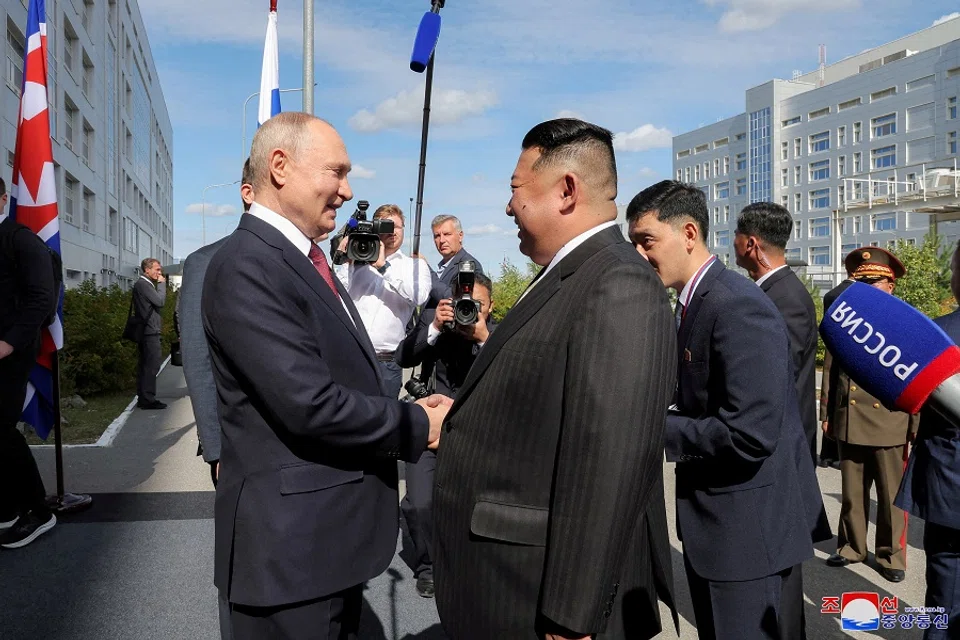China staying on the sidelines of growing Russia-North Korea ties
Cambodian research fellow Bunly Ek observes that China continues to play a wait-and-see approach on forming a trio with Russia and North Korea. China is well aware that it can achieve its objectives by staying close with each of the countries bilaterally, and a high-profile trio would only put itself in the firing range of the West and its other neighbours.

The rapid development of Russia-North Korea relations has come under the spotlight in recent months. From patiently waiting more than 30 minutes to meet North Korean leader Kim Jong-un in September 2023 to gifting Kim a Russian-made limousine, Russian leader Vladimir Putin is sending strong signals of positive relations between Moscow and Pyongyang.
This is vital as both countries are currently preoccupied with their own dire issues such as the Russia-Ukraine conflict and Korean peninsula tensions. Strong relations between the two would help each other overcome Western discontent and garner support to offset their shortcomings in humanitarian and military capabilities.
China staying on the sidelines
Bordering both Russia and North Korea, China seems to be adopting a wait-and-see posture and has no official intention of turning the current good Moscow-Pyongyang ties into good Moscow-Pyongyang-Beijing trilateral ties. Several observers have pointed out certain reasons why trilateral cooperation between the trio is not favourable to Beijing. These reasons range from Beijing's desire for global stability to China's preference not to be dragged into a head-to-head confrontation with Washington. However, China also sees other challenges and opportunities in not engaging in this trilateral pact.
Firstly, the trio of Russia, China and North Korea would definitely antagonise and lead the West and China's important neighbours, South Korea and Japan, to perceive Beijing as teaming up to disrupt the current international order. This is neither advantageous to China nor something China wants as it is currently seeking global stability and a stable international economy.
More importantly, China understands that by participating in the trio, the world would interpret the approach as Beijing supporting the Kremlin and Pyongyang in their cause which would almost immediately exacerbate the current unstable Seoul-Tokyo-Beijing relations as well as Beijing's relations with the West including the US.
Adding to that, the tripartite pact will further solidify the trilateral cooperation between Washington, Tokyo and Seoul which would underpin and strengthen the US's presence in the Korean peninsula, turning Washington's containment policy further into action.
Secondly, China already has firm bilateral economic, military, political and historical ties with both Moscow and Pyongyang.
... even without the trilateral cooperation between China, Russia and North Korea, Beijing will still possess strong geopolitical economic influence over the Kremlin and Pyongyang.

With Russia, Chinese President Xi Jinping has cemented the trust between Moscow and Beijing during President Vladimir Putin's bilateral visit to Beijing in October 2023. The bilateral talks spelt the continuation of the Russia-China "no-limits" partnership on top of the current trade between them that stands at more than US$240 billion in 2023, turning Beijing into a key unignorable ally for the Kremlin.
With North Korea, China signed the Treaty of Friendship, Co-operation and Mutual Assistance in 1961 pledging to support one another from any foreign attack. This treaty was renewed in 1981, 2001 and 2021 which serves as a reminder of both countries' strong military ties. On the economic front, like Moscow, Beijing is also a vital trading partner for Pyongyang, with North Korea's trade with China hitting the highest record in 2022 of US$1.53 billion according to Korea Trade-Investment Promotion Agency (KOTRA).
To China's advantage to keep a distance
Therefore, it is certain that even without the trilateral cooperation between China, Russia and North Korea, Beijing will still possess strong geopolitical economic influence over the Kremlin and Pyongyang. Hence, despite not engaging in the tripartite pact, Beijing will be less likely to be pressured by North Korea and Russia to enter into the one.
Many might think that by being silent on Russia-North Korea's improving relations, China would give away its influence on North Korea to the Kremlin. However, by doing so, China has shifted international attention towards Moscow and Pyongyang, potentially allowing itself space to address its economic needs while taking notes and lessons from the sanctions imposed on its neighbours.
Beijing will continue to reap the benefits of economic engagement with Moscow and Pyongyang, while for Russia and North Korea, a Russia-North Korea detachment from China is not practical nor advantageous for both Russia and the North Korean regime.
... being provocative now would only help bring Donald Trump closer back to the White House which is not in the advantage of Beijing in the next four years.
This leads to the third point. With China being one of the few actors that can negotiate and has a strong influence with both Russia and North Korea, it is only a matter of time before the world turns to Beijing for cooperation to mediate the tension. This strategy would nudge China from being a perceived antagonist by its adversaries to a significant actor - a global stabiliser - which could be utilised to China's geopolitical advantage.
Less chance of being demonised in US elections
Even more crucial, with the US elections around the corner and a possible rematch between Donald Trump and Joe Biden, China's "wait-and-see" posture could be implemented to prevent itself from being used as ammunition to bolster the election campaign by both the Democratic and Republican candidates. No doubt, China is still likely to be brought up in both parties' campaigns as Beijing continues to be perceived as a threat to Washington's geopolitical security but more focus will be placed on Russia's aggression in Ukraine, the war in Israel, the Red Sea security instability, and North Korea's military belligerence in East Asia.

In short, China foresees that the re-election of Donald Trump would likely reignite the tensions between Beijing and Washington, similar to the trade war during the Trump administration, while the continuation of Joe Biden in the White House would see Washington diversifying its efforts on Russia, Israel, Yemen, North Korea, and many other issues. Hence, being provocative now would only help bring Donald Trump closer back to the White House which is not in the advantage of Beijing in the next four years.
To date, China has not shown any official posture towards Russia and North Korea's improving ties while also signalling its unwillingness for a Beijing-Moscow-Pyongyang trilateral pact to avoid a new Cold War. However, China might remain discreet when supporting the Kremlin and Pyongyang, and the assistance will be done in a way that will not jeopardise China's market and profile in the West. While this approach will remain for the time being, it is clear that China is extremely cautious when engaging Russia and North Korea, with long-term planning for its geopolitical economic security.





